One question that is often asked is what is the appropriate media time or duration of use. It is not easy to give an answer that fits all children. Because every child is different! You know your child best. Therefore, you can best answer this question yourself by observing your child’s media use and recognizing what is good for him or her and fun, or when your child reaches his or her limits. Especially in the first years of life, children can quickly be overwhelmed by media, as they are not yet able to understand and classify them correctly. Colorful images, sounds, and complex stories can lead to overstimulation. Therefore, keep media time very low for babies and children up to about two years old.

© photothek.net
Nevertheless, media exert a fascination on children and at some point they also want to explore them more closely. Young children, of course, can not yet decide for themselves what measure is good for them. It is important that you accompany your child during this process, also to explain things. Create fixed and limited media times. Media rituals give your child structure. If possible, avoid leaving your child alone with media, especially when the device is online. Also consider the role media otherwise plays in everyday family life. If all other family members use a lot of media, it is difficult for the youngest to understand why they are not allowed to do so.

© photothek.net
Media exert a great fascination on young people and at the same time they are a natural companion in their everyday lives. Young people have already had a wide range of media experiences inside and outside the family, which also influence how they deal with media content. Since media offerings are as varied as the young people themselves and their environment, there can be little talk of clear-cut effects through media. While some young people can handle media violence or sad scenes well, others are more sensitive. Some are also better at distinguishing a fake piece of information from a real one, find action movies more entertaining, or get more carried away by music. Either way, media have a decisive influence on our values, lifestyles and desires.
In addition, as they grow up, young people use media that are not age-appropriate according to youth media protection. Fascination, provocation or pure curiosity play a role. Even though some teens have had many experiences with it, it doesn’t mean they are hardened or jaded. Young people are by no means only affected by media effects. Most of the time, they choose carefully, classify media, exchange ideas with their peers, think about their media experiences and deal with them critically – and you should support and accompany them in this.
Children and young people of this age have taken their first steps on the Internet and already know their way around reasonably well. Almost all of them now have their own cell phone or can use one of their parents’ devices. On the one hand, the interests and activities are as diverse as the children themselves; on the other hand, very similar phenomena can be observed. It is becoming increasingly important to use the media to build a world of their own, even without the guidance and supervision of parents. This includes communicating more and more with friends, increasingly unobserved by parents.
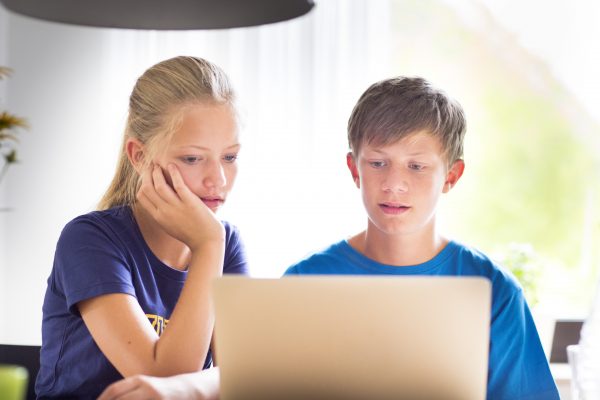
© photothek.net
Interests are further developed online. Children find out about topics of their own choosing, follow celebrities on social media or video platforms, and begin to show themselves off to their peers or even the public via various apps. For some, it is important to play undisturbed alone or with their friends – even online. In the process, they develop their own expertise and skills and live out their creativity.
Children and young people are not yet able to assess very well what it means to put certain data on the Internet, what other risks there are, or how it should be assessed when others misbehave on YouTube and the like. Increasingly, young people are moving away from purely child-friendly media use, going online more often on their own and repeatedly encountering content that can overwhelm them and that they cannot process on their own. In addition to youth media protection, you as parents should still lend a helping hand. Feel free to share your child’s diverse experiences on the web and also support your child’s formation of opinions about them. As parents, you have a particularly important guiding role in this transitional phase, and you should encourage safe use of digital media.
When children start school, they can already do a lot with media and enjoy using them. Because they can now read and write, they also want to operate media independently. At the same time, they look to you as parents, siblings and peers for guidance when it comes to choosing media content.
They enjoy fun and entertaining formats. Characters from stories they know from children’s series, books and magazines are role models they want to emulate and compare themselves to. They especially like stories that are about friendship. And media are also increasingly used for the search for identity. Who am I? What kind of girl or boy do I want to be? They increasingly use media to inform themselves and to learn. Search engines are becoming an important tool for this, as are YouTube videos.
For children and young people, media are important companions that support them in their development in various ways, among other things. Depending on their age, they take on different functions – whether entertainment and fun, orientation or information.

Copyright: Ute Grabowsky/photothek.net
For preschoolers, media are objects they want to discover for themselves. But they are also storytellers. Stories are told in media such as books – whether analog or digital, radio plays or films. Children use various media for playing, e.g. age-appropriate game and painting programs on the computer, smartphone or tablet. Even for younger children, there are suitable offers that they can use together with their parents. Even the media characters in a story can become playmates in children’s imaginations.
Even before they start school, children can learn with the help of media. Knowledge can be found in stories or is delivered in age-appropriate offerings such as The Elephant Show. Apps specially programmed for children can also be used to playfully discover new things together with parents.
In addition, media provide guidance for children. Here they find a variety of role models, some of them dubious. From an early age, children replay media content and try out behaviors seen there. In order to process what they have seen and to be able to classify it correctly, they need your support.
When you choose media options for your child, they should be age-appropriate and take their needs into account. Also, remember to provide alternative offerings to balance things out. Because a child’s needs can and should be met without media. Media are thus not given undue importance in children’s everyday lives.
If your child starts to understand and want to use digital media when he or she is two or three years old, you should not leave him or her to do so alone. It is crucial that you experience how your child deals with it, what he already understands and what he likes. You decide what content it looks at and listens to. Find out in advance about suitable offers suitable for children.
In the early years, your child will experience many changes due to their physical and mental development, so regularity is important. Fixed rituals provide reliability and orientation for your child. This also applies to media sharing. Consider a set time slot on weekends and evenings before bed when you watch a video clip or listen to an audio drama together. Also take the time to talk about it with your child afterwards. The exchange is important so that it can process what it has seen or heard.
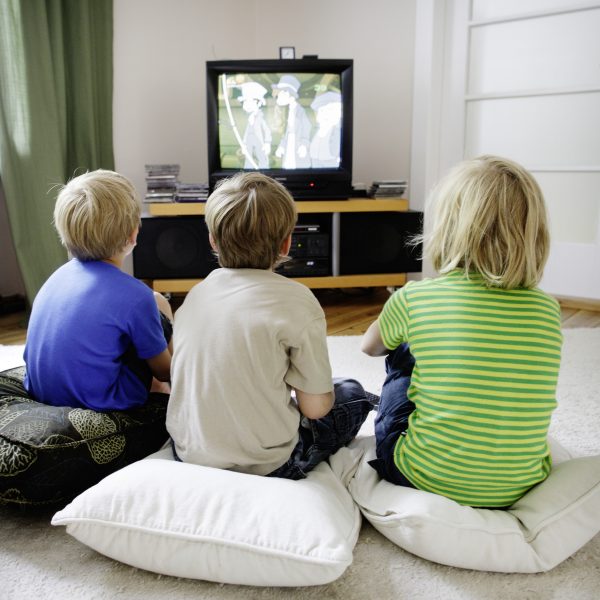
Children watching television | Copyright: Thomas Koehler/photothek.net
Who does not know this? Weekend, 6:00. The child is wide awake, but you are not. So it’s easy to just turn on the TV or tablet and have at least a few well-deserved minutes of peace and quiet – and why not? In everyday family life, there are simply moments when tablet or television are a convenient way to take a quick breath. And it’s so convenient that it’s very hard for us not to do it. As long as it doesn’t become a habit and we don’t misuse media to the detriment of the child, it’s perfectly permissible. However, you should then make sure that your child can only access age-appropriate and familiar media content and that he or she does not sit alone in front of the device for hours on end. Because especially in the early years, your child needs guidance when using media.
One way of establishing common rules for media use in the family is a media use agreement. The media literacy initiatives
klicksafe
and
Internet ABC
have developed an online tool for this purpose. With this, you can individually determine together with your children which media and content may be used in the family, how and for how long. The tool offers a variety of customizable rule templates for children under or over 12, as well as for parents. There is also the possibility to create your own rules.
You can find the tool at www.mediennutzungsvertrag.de.

Copyright: Ute Grabowsky/photothek.net
Especially during puberty, you may sometimes find it difficult to understand your own children. Their interests change quickly and as parents you can hardly keep up. Still, it’s important to stay in conversation with your child, especially when it comes to media use. Show interest and try to understand what attracts your daughter or son to certain media (content). Let them show you things and avoid judgments! In a trusting atmosphere, your child will then also approach you if he or she ever encounters unpleasant media content.
One question that is often asked is what is the appropriate media time or duration of use. It is not easy to give an answer that fits all children. Because every child is different! You know your child best. Therefore, you can best answer this question yourself by observing your child’s media use and recognizing what is good for him or her and fun, or when your child reaches his or her limits. However, it is important that you agree on times and duration, e.g. with the help of a media use contract. Media rituals also help your child structure their day and media use. For adolescents, hand over responsibility for appropriate media time step by step. Nevertheless, stay in conversation with your child. Does it understand what the show, movie or game is about? Does certain content scare him? Does it know age restrictions on movies and games and security settings on devices and apps? Ask what media content your child likes and why. If it has little or no alternative interests and activities, or if any non-use causes great stress, consider together what you can change.
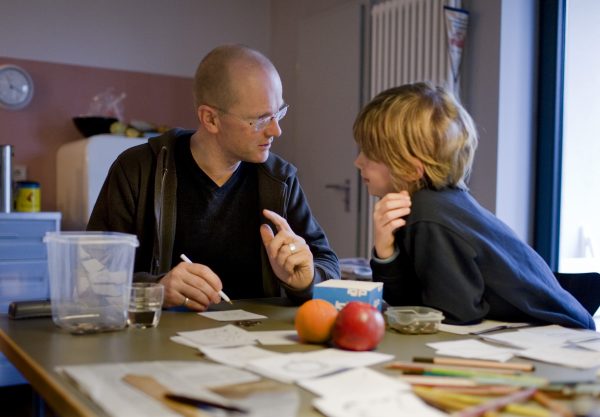
Copyright: photothek.de
Try to keep up to date with your child’s media worlds, stars and heroes, their favorite sites on the web, favorite computer games and apps. Talk with your child about his or her media preferences. Be your child’s first point of contact – not the Internet or television. Talk to your child about what they are experiencing in the media and help them understand and process it. Give your child peace of mind. In doing so, you also strengthen trust in each other. Conversations should be a high priority in the family. In a trusting atmosphere, your child will then also approach you if he or she ever encounters unpleasant media content.
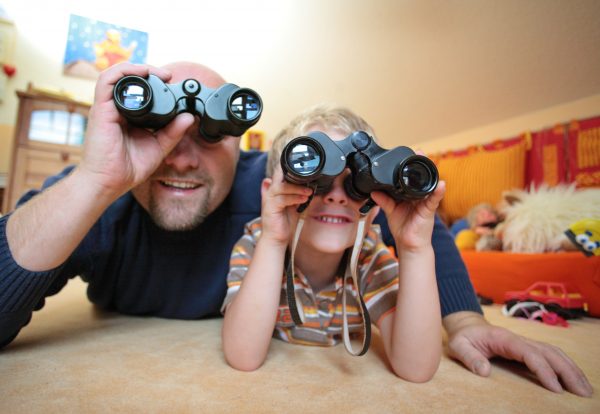
Copyright: U. Grabowsky/photothek.net
Media can inform and entertain. They are meant to bring joy, not fear. Whether it’s video, audio, images, text or games, media comes in many different forms. Children can learn to deal with media in a meaningful way through various offers. This is also possible with computer games. Responsible use of media is important in order to be more protected from dangers on the Internet. Your child can learn this only with your help.
It’s also up to you what media your child uses and how they use it. Help him to do so! Dare to try new media for you, too. If your child has a particular interest in an offering, the best thing you can do is explore and understand that offering with your child.
There is a suitable media offer for almost every concern. Our article ” How can I recognize a good children’s site?” will help you find media content suitable for children. Or take a look at which offerings have received the Educational Media Award in recent years.

Boy with laptop eating | Copyright: Ute Grabowsky/photothek.net
Continuous background noise and images are counterproductive, and not only for children. Pay attention to whether you or your child is really watching or listening and if not, just switch off. To find out if your child is still paying attention to the content, just ask what is happening there.
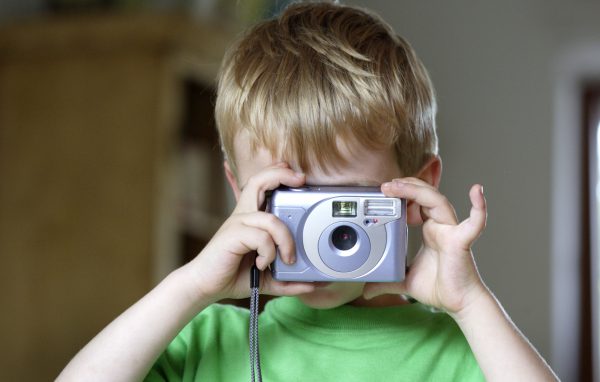
Copyright: photothek.de
Using media means more than writing news and watching movies. As a parent, you should show your child the many ways he or she can use media. Encourage your child to make their own media. Let it take its own pictures, make videos or create radio plays. Accompany your child in this process and create media content together. This also provides an opportunity to talk about the technology in question, its possibilities and risks. Also learn from your child yourself. Especially when it comes to digital media, our children are often more familiar with it and are much more open about it.
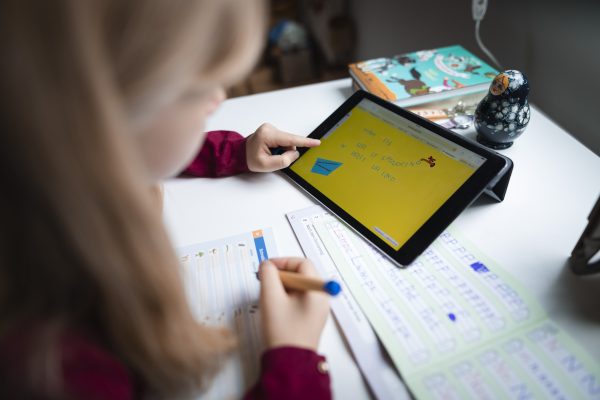
Copyright: photothek.net
Your child is not only looking for entertainment on the web, tablet and laptop are not just for passing time. Children and young people also use media specifically for learning and information – whether on behalf of the school or out of their own interest. If your child feels you don’t believe him when he learns with the tablet, it will lead to frustration. The fact that digital media are so fascinating opens up the opportunity to combine learning and fun. You should support this!
Especially in secondary school, it is becoming natural for children and young people to use digital media for school: They do research for lectures or create a presentation on a laptop. Your child may also be using an online tutoring service.
Your child learns that digital media are not just for entertainment and communication, and acquires important skills that he or she will probably need later in his or her career.